
If you have sensitive skin, you may think that it means your skin is dry and uncomfortable. You might also think that you need to put more moisturizer on because your skin feels tight. But what if the opposite is true? Does that mean that your skin isn’t sensitive at all? What causes sensitization in the first place? And how can you prevent it from happening again? Let’s look at these questions and more as we explore how having sensitive skin doesn’t have to make life miserable for those with this condition.
So, what is sensitive skin?
Sensitive skin is not the same as dry skin. It’s more than just a little bit dry and itchy, or with a few pimples here and there (although those can be uncomfortable).
Sensitive skin can be sensitive to everything from soap to clothing dyes to irritating household chemicals like bleach or detergent residue left on fabrics.
Having a better understanding of what causes sensitization can help you prevent it from happening.
Sensitivity is a reaction to a specific substance, which causes the skin to become red and irritated. It’s different than irritation, which is caused by things like soap or detergent that leave behind chemical residue on your skin as they dry. Sensitivity occurs when this residue combines with other chemicals on our bodies (such as perfumes) and creates an allergic reaction in our bodies—causing itching or burning sensations in our hands or feet when we touch certain fabrics like wool socks or towels after being exposed to them for extended periods (like at home).
Use the right products for your skin.
- Fragrance-free use products.
- Avoid products with alcohol and other harsh chemicals.
- Use a gentle cleanser to remove makeup, oil, and dirt from your skin before applying moisturizer or sunscreen.
If you have sensitive skin:
- Use hypoallergenic moisturizers and cosmetics (avoiding products with an “alcohol” ingredient). You may also want to avoid products that contain artificial fragrances or dyes; these can irritate the skin if not properly diluted by water or another ingredient in the product formula.
Gentle cleansing is critical if you have sensitive skin.
The first step in treating your skin is to use a gentle cleanser. If you have sensitive or dry skin, it’s important to avoid using harsh soaps and scrubs that can irritate your skin further. Instead of using strong products that are designed for the face (or any other part of the body), try looking for gentle ones that won’t leave behind any residue on your face after washing off.
If you have sensitive or dry skin, don’t scrub too hard with soap when cleaning up after showers or baths—this will only increase irritation and redness! For example: if there are areas where makeup has been left behind but can’t be removed because they’re too far under the surface; then gently wipe them away with cotton balls soaked in warm water until everything comes off easily without causing any irritation.”
Moisturize sensitive skin to eliminate dryness and improve comfort.
Moisturizers can be used to prevent dryness and improve comfort. Moisturizers should be light and non-greasy, with a pH level of 5 to 6. They should also have no fragrance or color additives, as these can be irritating to sensitive skin. If you use a lotion or cream moisturizer, choose one that is designed for sensitive skin types rather than one that is more heavily scented with essential oils (which might aggravate your eczema).
Check with your dermatologist before choosing a sunscreen product or another formula with SPF.
To ensure that your sunscreen product is effective, you should consult with your dermatologist. The SPF number on a bottle indicates how well the sunscreen protects against UVB rays. However, this measure may not be enough to prevent damage from UVA rays—the ones responsible for wrinkles and aging skin.
Sensitive skin doesn’t have to mean dry, tight, and uncomfortable.
Sensitive skin doesn’t have to mean dry, tight, and uncomfortable. It can also be oily, red, and flaky. There are many ways that sensitive skin can look:
- Dry (without being flaky)
- Oily (without being shiny)
- Flaky
- Itchy
Conclusion
With the right products and a little patience, you can avoid having sensitive skin. It’s important to remember that everyone has different needs when it comes to their skincare routine, so don’t feel like you have to do or use everything on this list. There may be other things that work better for one person than another, but at least now you know what caused your eczema or acne in the first place!



